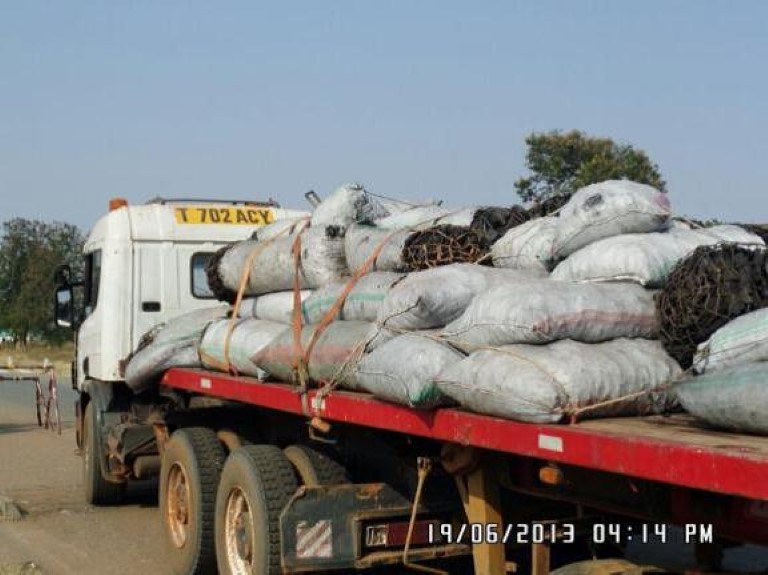240 kg of elephant ivory and 856 timber logs seized after a joint law enforcement

INTERPOL has received a number of intelligence reports highlighting likely connections between ivory smuggling and timber transport in Eastern and Southern Africa. These reports include allegations of ivory being frequently hidden among charcoal containers or inside welded chambers of trucks used to transport logs across borders. Further, it is recognised that law enforcement officers responsible for patrolling forest regions need to work hand in hand with rangers responsible for conducting anti-poaching patrols.
As a result, Project LEAF engaged in a joint law enforcement operation with another project of the Environmental Security Sub-Directorate, Project Wisdom, to combat ivory trafficking and illegal logging across Southern and Eastern Africa. The operation included a number of joint patrols involving forestry and wildlife officers, along with police support. The operation jointly targeted ivory smuggling and illegal logging, with smugglers often concealing ivory inside charcoal containers or welded chambers of trucks used to transport logs across borders.
The month-long operation (between September and October), involved wildlife enforcement officers, forest authorities, park rangers, police and customs officers from five countries ‒ Mozambique, South Africa, Swaziland, Tanzania and Zimbabwe.
As a result of the joint operation, more than 240 kg of elephant ivory and 856 timber logs were seized and 660 people arrested. Also seized were 20 kg of rhino horns, 302 bags of charcoal, 637 firearms, nearly 2,000 rounds of ammunition, 30 chainsaws, 200 kilos of cannabis and khat, 65 pellets of heroin, 47 animal parts and 44 vehicles.
The enforcement operation identified major networks involved in the smuggling of elephant ivory, as well as illegal shipments of timber and charcoal. The operation generated greater focus on the extent of illegal charcoal trade in the region, and the involvement of organized crime in the illicit charcoal business. Through analysis and comparison with information stored in INTERPOL’s global databases, law enforcement officers were able to obtain a clearer picture of how to more effectively target resources and disrupt the transnational crime networks involved.
For each tonne of charcoal produced requires 7-10 m3 of wood. Charcoal is a primary energy source in many parts of Africa, and a major cause of deforestation. Estimates of charcoal production in eastern Africa alone are as high as 7 million tons – or the equivalent of 49-70 million m3 logged wood. The collaboration with UNEP GRID Arendal and intelligence derived indicate that illicit charcoal trade is depriving governments in eastern Africa of revenue losses of several billion US Dollars annually.
Currently, the official production of charcoal in Africa is over 30.6 million tons annually, representing an estimated value of US$10.2-28.8 billion, with lost revenue to governments of at least US$3-9 billion annually. Globally it accounts for at least US$6-15 billion in lost revenues or 5-10% of ODA. With current projections, the demand may double in the coming decades. The impacts involve a dramatic increase in emissions associated with deforestation, increased emissions of black carbon or short-lived climate pollutants, and also very serious health risks both indoor and outdoor in the slums, where charcoal may provide the only affordable energy source.
